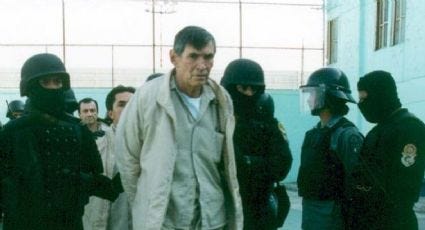Miguel Angel Felix Gallardo: Rise and Fall of the Godfather

Miguel Angel Felix Gallardo, also known as “El Jefe de Jefes” or “The Godfather,” is a notorious figure in the history of the Mexican drug trade. His life is a complex tapestry of power, crime, and ultimate downfall. In this article, we’ll delve into the intriguing narrative of Felix Gallardo’s rise to power and the critical mistakes that led to his eventual arrest, drawing insights from two detailed texts on his life and downfall.
The Ascent to Power:
Miguel Angel Felix Gallardo was born on January 8, 1946, on a ranch in Bella Vista, Sinaloa. Despite growing up in poverty, he managed to graduate from high school, showcasing an early determination to overcome obstacles. His aspirations for a college education took a detour, leading him to join the police force at the age of 17. Working as a Mexican Federal Judicial police agent and later as a family bodyguard for Sinaloa Governor Leopoldo Sanchez Celis, Felix gained insights into the corridors of power.
His insatiable hunger for wealth and a chance meeting with a drug smuggler named Pedro Aviles Perez marked the turning point in Felix’s life. Perez recruited him into the drug trade, setting the stage for Felix to eventually take over the business after Perez’s death in 1978. The Felix Gallardo organization emerged, later evolving into the infamous Guadalajara cartel.
The Guadalajara Cartel’s Ascendance:
The Guadalajara cartel, under Felix’s leadership, became a dominant force in the Mexican drug trade during the 1980s. Forming alliances with key figures like Rafael Caro Quintero and Ernesto Fonseca Carrillo, the cartel’s influence expanded rapidly. Its drug empire included the Rancho Buffalo marijuana plantation, spanning over 2,000 acres of land and reportedly generating up to $8 billion annually.
Felix strategically formed affiliations with the Cali cartel and the Medellín cartel in Colombia, establishing connections to powerful Colombian organized crime groups. The Guadalajara cartel’s success was attributed to its lack of internal rivalries and competition within Mexico, further solidifying its powerful position in the drug trade.
Strategic Maneuvers and Political Protection:
Felix Gallardo’s strategic prowess extended beyond the drug trade. Reports indicate that the Guadalajara cartel enjoyed protection from the Mexican DFS (Federal Security Directorate) and other intelligence agencies, shielding them from legal troubles. Allegedly, bribes facilitated this protection, allowing the cartel to operate with relative impunity.
Despite his criminal activities, Felix’s political connections allowed him to navigate through the complexities of Mexican law enforcement and high-ranking government officials. The cartel’s influence grew, leading to affiliations with prominent Colombian drug lord Pablo Escobar.
The Catalyst for Downfall — Kiki Camarena’s Murder:
The turning point in Felix Gallardo’s life came with the murder of DEA (Drug Enforcement Administration) agent Enrique “Kiki” Camarena in 1985. Kiki, posted in Guadalajara, uncovered cartel-owned marijuana plantations in Zacatecas state. A raid was initiated to destroy these plantations, posing a significant threat to the Guadalajara cartel.
Enraged by Kiki’s relentless pursuit, the cartel orchestrated his abduction on February 7, 1985, allegedly at the behest of Felix Gallardo. Kiki and his helicopter pilot, Alfredo Zavala Avelar, were taken to a residence owned by Rafael Caro Quintero. The subsequent autopsy revealed Kiki’s brutal torture and murder.
Operation Leyenda and Felix Gallardo’s Arrest:
The murder of Kiki Camarena triggered Operation Leyenda, the largest operation in DEA history. The investigation targeted Felix Gallardo and his associates, including Rafael Caro Quintero and Ernesto Fonseca Carrillo. Two theories emerged — one implicating Felix in the abduction and Kiki’s murder, and another suggesting CIA knowledge of the abduction.
Mexican authorities, fueled by the outrage over Kiki’s death, launched a relentless pursuit of justice. In 1989, Felix Gallardo was arrested, charged with kidnapping and murdering DEA agent Kiki Camarena, along with charges of racketeering, drug smuggling, and violent crimes. He was sentenced to 37 years in prison.
The Fall of the Guadalajara Cartel:
Felix’s arrest marked the beginning of the end for the Guadalajara cartel. Top members left to form their own cartels, and the organization crumbled in the aftermath. The once-powerful drug lord, now imprisoned, faced a loss of control over his empire.
Life Behind Bars:
Even in prison, Felix Gallardo maintained influence. With the help of his lawyer, he sought to optimize the drug trade chain for efficiency. The revelation of widespread corruption within Mexico’s police force, exposed during his arrest, further emphasized the depth of his connections.
Despite losing control over the cartel, Felix continued to wield influence from behind bars. His lieutenants were released, and the cartel’s remnants persisted, indicating the enduring impact of his criminal legacy.
The Twilight Years and House Arrest:
In 1993, Felix’s transfer to a maximum-security facility signaled a loss of control over other drug lords, contributing to the crumbling of his cartel. As time passed, some of his lieutenants were released, with Rafael Caro Quintero granted release on a legal technicality in 2013. Ernesto Fonseca Carrillo was transferred to house arrest in 2016.
In a surprising turn of events, on September 12, 2022, Felix Gallardo was granted house arrest due to health issues. Mexican President Andrés Manuel López Obrador cited the need for treatment that couldn’t be provided in prison, acknowledging Felix’s delicate health condition.
The life of Miguel Angel Felix Gallardo is a testament to the intricate interplay of power, crime, and consequences. From his humble beginnings to becoming the godfather of the Mexican drug trade, Felix’s story is one of strategic brilliance and ultimate downfall. The murder of DEA agent Kiki Camarena served as the catalyst for his arrest, revealing the extent of corruption and influence within Mexico’s law enforcement. Despite his incarceration, Felix continued to exert influence, leaving behind a complex and enduring legacy in criminal history.
